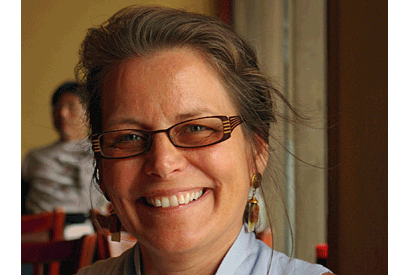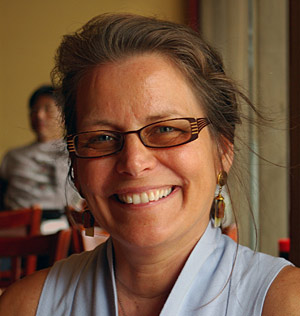New life for lifelong learning at Berkeley
It took two tries for Berkeley's lifelong learning center to achieve liftoff. Now, in its second incarnation, OLLI@Berkeley has become a vital resource for nearly 1,000 enthusiastic students over the age of 50 - and a bridge between the campus and the greater Bay Area community.

January 7, 2011
Even for the world’s premier public university, launching a world-class “center for lifelong learning” can be a tricky proposition. It took Berkeley two tries to get it right.
A first effort never achieved liftoff. Today, by contrast, not only is the campus among the 120 Osher Lifelong Learning Institutes (OLLI, for short) worldwide, but it counts a growing constituency of nearly 1,000 Bay Area residents — most between the ages of 50 and 75 — as members. On the strength of four successful years, it could soon reap a second $1 million endowment from the Bernard Osher Foundation, which has seeded OLLIs in every state, including 30 in California alone.
Where UC Extension focuses mainly on professional development and certificate programs, OLLI is about learning “for the joy of it” — the title of a video on its website — without tests or grades in what OLLI terms “an ongoing learning community.”
What distinguishes OLLI @Berkeley from its sister institutes is that it offers something uniquely valuable: access both to Berkeley faculty (including luminaries like energy professor Dan Kammen, currently leading an online class) and to such local lights as Larry Bensky, a former literary editor best remembered as a political journalist on KPFA — returning this session with a class on Marcel Proust — and San Francisco Chronicle theater critic Robert Hurwitt.
In addition to classes, OLLI presents lectures year-round, facilitates member-organized discussion and activity groups known as “interest circles” and, for the vacation-minded knowledge-seeker, offers travel programs like this month’s weeklong trek to the Tahéima Wellness Resort and Spa in Nuevo Vallarta, Mexico.

Susan Hoffman (Aileen Kim photo)
Susan Hoffman, OLLI@Berkeley’s director, views the program’s current incarnation as a two-way connection between the campus and its neighbors. OLLI, she says, gives older adult learners a university-sponsored public arena in which they can create “a community of engagement and collaboration,” while providing Berkeley faculty, postdocs, grad students and visiting scholars the opportunity “to teach what they love” to classrooms of highly educated, highly motivated older students.
The program’s diversified, often surprising course offerings — its fall 2010 schedule covered everything from cross-cultural communication and singing instruction to the First Amendment and “Borges and Buddhism,” while winter 2011 adds classes on such topics as personalized medicine, space science and comparative political history of Turkey and Iran — “help link older adults with the intellectual and cultural resources at Berkeley,” Hoffman says.
Suggestions for courses, she adds, frequently come from Berkeley faculty, some of whom find the experience so rewarding that they help OLLI recruit their colleagues.
“Many of my OLLI students are extremely bright, accomplished professionals who ask really interesting questions and have a great understanding of what’s being presented,” observes David Presti, a senior lecturer of neurobiology, whose class on perception and consciousness attracted a large audience that included judges, librarians, acupuncturists — in short, a typical OLLI crowd. “That’s very satisfying for a teacher.”
Linda Rugg, an associate professor of Scandinavian — she’s teaching “Mark Twain” this spring — taught a fall 2010 class on Ingmar Bergman, and found her classes enriched by the students’ real-world experience: “They know about love, death, betrayal, marriage — and a certain level of recognition and empathy or understanding comes out in the discussion.”
2nd time’s the charm
For Berkeley, too, experience was a key to success in lifelong learning. In 2003, the Osher Foundation seeded a Berkeley outpost under an arrangement that requires each new OLLI to hit membership benchmarks in each of four years in exchange for annual funding. After four years, membership of more than 500 students qualifies a university for a $1 million endowment, while membership of 1,000 for two years can mean another million-dollar gift.
Berkeley failed to reach its benchmarks, and the program went on hiatus after two years. But the time wasn’t wasted.
Campus administrators worked with experts in the field to develop a new program model for a Berkeley-based OLLI, and plans for a second launch were approved by the Academic Senate. A national search for a director landed Hoffman, a writer and filmmaker with a decade’s experience as executive director of the California Confederation of the Arts, followed by 15 years launching a series of interdisciplinary and international programs at UC and CSU campuses. She was a founding director of OLLI at San Francisco State University.
Now in her fourth year at the helm, Hoffman oversees some 200 volunteers engaged in raising funds — besides its Osher support, the institute depends on a mix of membership dues, course fees and private donations — boosting membership and developing curriculum. OLLI @Berkeley offers 75 courses annually over three six-week terms in the spring, fall and winter.
Under Hoffman — in concert with Berkeley vice provosts Christina Maslach and Cathy Koshland, whom she credits for nurturing OLLi’s growth — the OLLI curriculum has developed into a resource for accessing Bay Area arts, gaining insight into current events with leading scholars from Berkeley, and exploring issues of aging and mortality, as well as putting principles of healthy aging into practice — the underlying drive behind the lifelong-learning movement.
“It’s Mr. Osher’s premise that people become a member of a lifelong-learning community, not just an individual taking classes,” she explains. The approach seems to be paying off, and not just in endowment funds. “Our members are constantly surprised that they get more than they’re expecting,” Hoffman says. “And we want to keep it that way.”
For psychologist George Hersh, an active 75-year-old student, OLLI membership has undeniable benefits. But with success come challenges, too.
“The general quality of classes is climbing,” he explains, “and you’re faced with agonizing choices.”
In advance of its winter 2011 session — which begins Jan. 24 — OLLI @Berkeley will hold an open house Tuesday, Jan. 11, from 10 a.m. to noon at Berkeley’s Freight and Salvage Coffee House. For more information about the institute and this year’s classes, lectures and programs, visit the OLLI@Berkeley website.